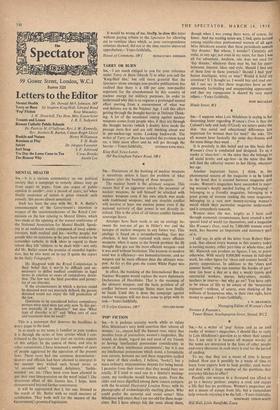SIR,—Discussion of the banning of nuclear weapons is unrealistic unless
it faces the problem of what happens after the banning of these weapons.
The nuclear bomb is the ultitrwte weapon. This means that if an aggressor attacks the possessor of nuclear weapons, he will himself be attacked with nuclear weapons even if his own attack was made with traditional weapons; and any sizeable conflict will involve at least one nuclear power even if the national territory of that power is not directly in- volved. This is the crisis of all future conflict between sovereign States.
Attempts have been made to see an analogy be- tween the non-use of gas in Hitler's war and the non-use of nuclear weapons in any future war. This analogy is based on a misunderstanding. Gas was .obsolete, it had been replaced with more efficient weapons; when it came to the Jewish problem the SS thought that gas was the most efficient weapon—and it was used without hesitation. The keynote to modern total war is efficiency—not humanitarianism; and no weapon can be more efficient than the ultimate wea- pon. As far as this goes the recent White Paper was quite sound.
In effect, the breaking of the International Elan on Nuclear Weapons would replace the more diplomatic Declaration of Hostilities. That is the meaning of the ultimate weapon; and the basic problem of all conflict between sovereign States must now finally be faced. Until this is done the campaign against nuclear weapons will not have come to grips with its task.—Yours faithfully,


































 Previous page
Previous page